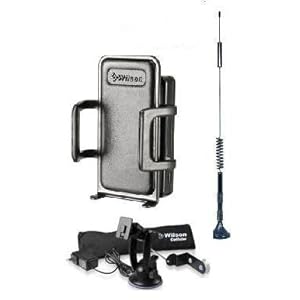cruz-in wrote:
docj wrote:
sdianel wrote:
I use the Wilson Sleek and got the window mount suction cup mount and a taller antenna. I put the antenna on the inside of the window. Place the phone or wi-fi hotspot on the Wilson Sleek. Worked for me all over the US. If I get a weak signal I can boost it enough to make calls and get online. Is it real fast? No. But works for me and price is reasonable. I ordered mine from Walmart.com
In most situations there is absolutely no relationship between the speed of your connection and the strength of the signal. Amplifying a signal doesn't "make it faster". The only way a cellular booster can provide additional speed is in those situations in which a 4G signal might be too weak to reliably connect to so the phone would go to 3G without an amplifier. But in normal use, the amplifier simply provides a stronger more stable signal. So if your Wilson Sleek works for you, the chances are that a more expensive amplifier would not produce any better result.
From the user standpoint, this is not the case.
I will concede that strictly speaking (at the physical and data link layers) this is true. The data rate at the Physical and data link layers does not change. However at the upper layers of the stack (like the network and application), the "effective" data rate can, and usually does, drop off at at lower signal strengths. At lower signal levels you get more dropped/corrupted packets. The upper upper layers of the stack (like network and application) must request re-transmission of these packets. Thus effectively (and at times significantly) reducing the effective (which is all the user cares about) "speed" of the connection.
It is true that amplifying a bad signal just gives you an amplified bad signal and will result in no increase in effective speed.
Additionally, this statement (no speed increase) does not consider one of the key factors of a good signal booster:
1) The antenna for the signal booster is usually placed in a position that it is getting a much better signal (like on the roof), than would be present at the antenna of your cell phone (in your car or RV). Hence it is receiving a much better signal to start with.
2) The antenna on a good cell booster is much more sensitive that the one on your cell phone. hence it received weaker signals and eliminates many of the errors/corrupted packets due to low signal.
Sorry if I jumped into lecture mode, I have a Master of Science of Electrical Engineering, specializing in communications...this is what I do for a living....this is probably way more info that was needed...
Thank you for your lecture notes.
The answer I wrote was directed at the average reader of this forum who does not have a degree in Electrical Engineering (or in physics, which is what mine is in).
Your explanation is excellent; at the margin of very weak signals and dropped/corrupted packets an amplifier can improve perceived (effective) speed, but only to the extent of reducing the packet re-transmission issue and getting the signal to an adequate level. I alluded to that when I mentioned that an amplifier might, for example, make it possible to connect using 4G/LTE rather than 3G or 1XrTT.
However, from my experience the user will far more commonly find himself in a situation in which his amplifier provides him no speed improvement and this puzzles many people. Believe me, I know, because I go through this discussion relative to WiFi on an almost daily basis regarding the products sold by WiFiRanger.
The average, non-technical reader does not understand that once an adequate signal is available further improvement will not increase the speed or stability of his connection. Nor does the average user realize that the "bars" displayed on his phone are nothing more than a coarse, qualitative measure of the received signal and that a real measurement can't be made from observing those.
For the sake of those who have long ago stopped reading this thread, let's agree that an amplifier/booster can, in cases of very weak signal, provide a speed improvement, but in a far larger percentage of cases it will improve the stability of a cellular connection without noticeable improvement in throughput speed. That way, those who are thinking of buying one of these devices will not have their expectations raised to an unattainable level.

